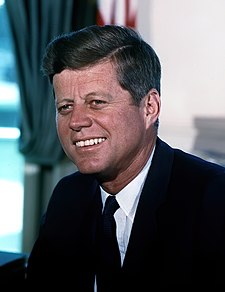Difference between revisions of "1960s"
(→Summary) |
(→Summary) |
||
| Line 1: | Line 1: | ||
== Summary == | == Summary == | ||
| − | This term frequently refers to the time period beginning in January of 1960 and ending in December of 1969. However, the cultural significance of the "1960s" of ten refers to a broader span of time. Many people believe that the cultural time period was ushered in by U.S. President John F. Kennedy in his inaugural speech. The end of the "1960s" is generally extended to the U.S. presidential election of 1972. | + | This term frequently refers to the time period beginning in January of 1960 and ending in December of 1969. However, the cultural significance of the "1960s" of ten refers to a broader span of time. Many people believe that the cultural time period was ushered in by U.S. President John F. Kennedy in his inaugural speech. The end of the "1960s" is generally extended to the U.S. presidential election of 1972. |
| − | This Time period in was marked by social | + | This Time period in was marked by social, political and cultural upheaval in the United States as well as other nations. |
| + | |||
| + | Among the different citizens groups calling for social and political change were the Black Panthers, National Organization for Women, Gay & Lesbian Rights, The Gray Panthers, The United Farm Workers and The New Left. Legislative initiatives such as Civil Rights legislature, the War on Poverty and the Peace Corps were changing the way the U.S. Government responded to peoples' needs at home and abroad. | ||
| + | |||
| + | Music and art of the decade both reflected the climate of change and lead the call for change throughout the decade. Hallucinogens and other drugs were | ||
== Significant People == | == Significant People == | ||
Revision as of 11:35, 2 September 2008
Summary
This term frequently refers to the time period beginning in January of 1960 and ending in December of 1969. However, the cultural significance of the "1960s" of ten refers to a broader span of time. Many people believe that the cultural time period was ushered in by U.S. President John F. Kennedy in his inaugural speech. The end of the "1960s" is generally extended to the U.S. presidential election of 1972. This Time period in was marked by social, political and cultural upheaval in the United States as well as other nations.
Among the different citizens groups calling for social and political change were the Black Panthers, National Organization for Women, Gay & Lesbian Rights, The Gray Panthers, The United Farm Workers and The New Left. Legislative initiatives such as Civil Rights legislature, the War on Poverty and the Peace Corps were changing the way the U.S. Government responded to peoples' needs at home and abroad.
Music and art of the decade both reflected the climate of change and lead the call for change throughout the decade. Hallucinogens and other drugs were
Significant People
John F. Kennedy 